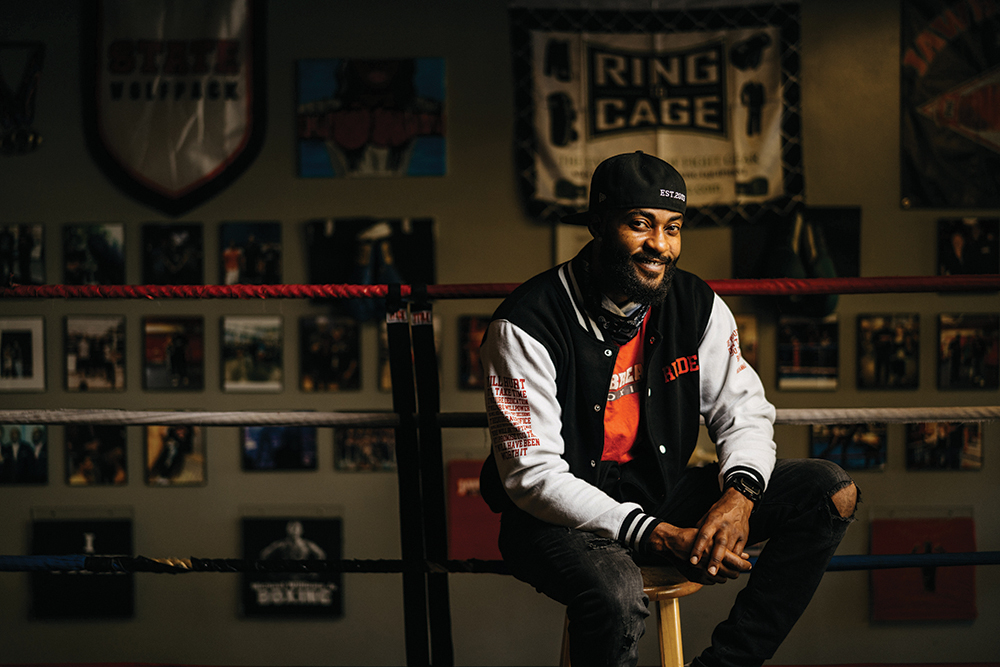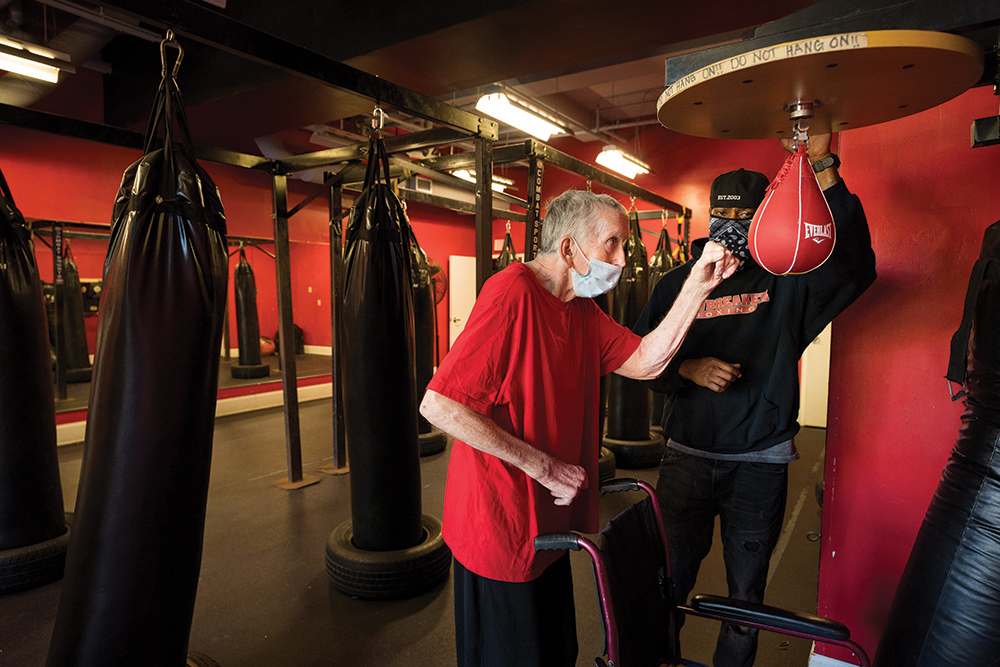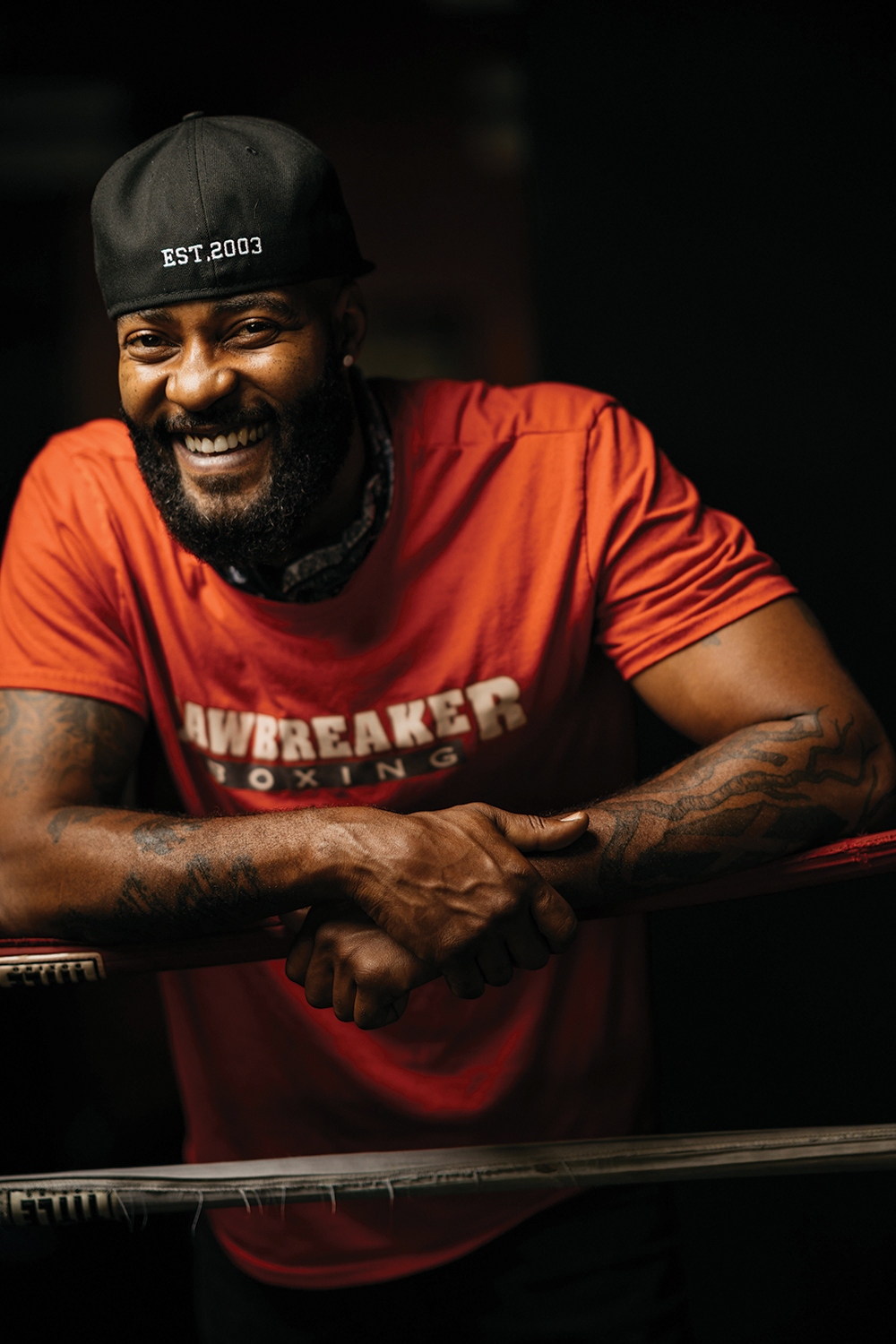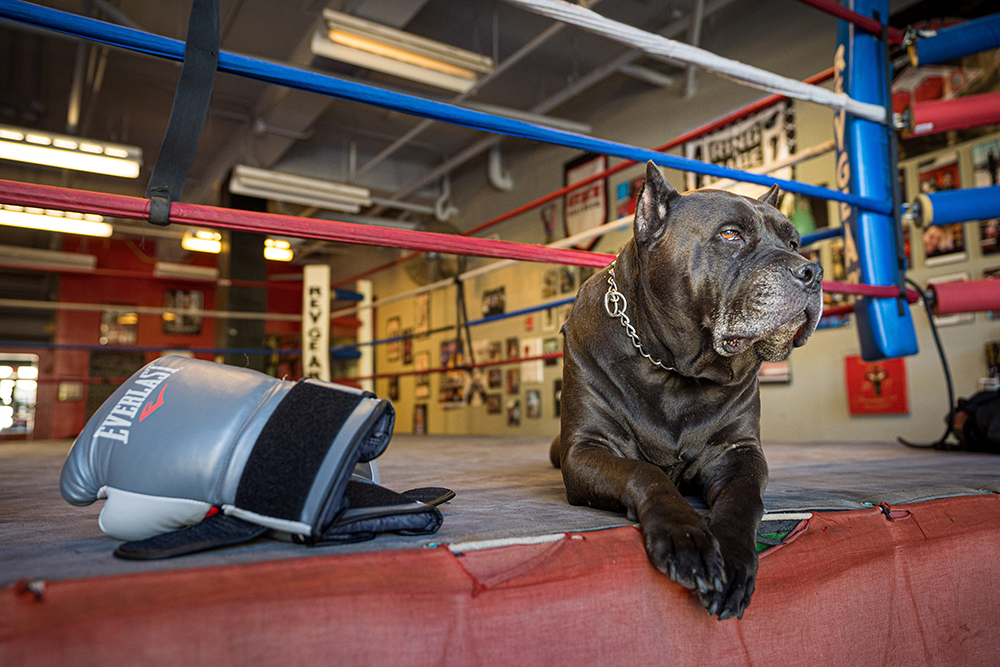Remy Fullwood uses boxing techniques—and his own experience—to help clients with Parkinson’s disease.
By Finn Cohen | photography by Justin Kase Conder
On a Sunday night three years ago, Sylvia and Larry Thomasson were watching the news in their Zebulon home when a report came on about an organization that uses boxing to treat people with Parkinson’s disease. Larry Thomasson, who had just been diagnosed with the disease, immediately perked up: “That’s what I want to be in,” he told his wife.
For about four years, the Thomassons had been shuffling between doctors who could not explain his symptoms—his right hand and arm had started shaking uncontrollably, and he had trouble speaking and swallowing—and they’d finally gotten a diagnosis. According to the report, boxing has well-documented benefits for people diagnosed with Parkinson’s; the full-body sport relies on hand-eye coordination and balance, and drills that emphasize repeated movements that can help offset physical and cognitive degeneration. The next day, Sylvia Thomasson started calling Triangle-area gyms to find availability. The first few weren’t able to give her specifics about their programs, but when she reached a no-frills, sweat-stained gym tucked into a corner strip off Glenwood South, she got Remy Fullwood.
Fullwood, the owner of Jawbreaker Boxing, is a former professional boxer
who’s trained under a U.S. Olympic boxing coach. He cuts an imposing figure at six-foot-two, barreling into the gym parking lot on a black Harley-Davidson most mornings. He also has multiple sclerosis, so he understands what it’s like to have your body betray you. He told Sylvia Thomasson to bring her husband in at the end of the week.
“The first day, I basically had to pick Larry up out of his truck and put him in his wheelchair,” says Fullwood of their first meeting. But that was the beginning of months of vigorous training. “Every day I would just push Larry down [to the end of] the parking lot and just make him walk his feet [all the way back].”
“He arrived in a wheelchair,” confirms Cathy Deats, an Episcopal priest who trains with Fullwood and proposed that he work with clients with Parkinson’s (she does assessments for potential clients for another program in the Triangle). “But about six months later, I drove into my session and saw Larry pushing the wheelchair with Remy sitting in it.”
Many Parkinson’s training programs involve group classes, but Fullwood’s program is built on a one-on-one rapport with his clients; Jawbreaker currently has five Parkinson’s clients, he says, spread around several different trainers. For him, it’s a way to give back—and show people that having a disease isn’t a reason to give up.
“They actually got him doing sit-ups on the floor,” Sylvia Thomasson laughs, noting that her husband’s progress has been well-documented on Jawbreaker’s social media pages. “Remy even got us ringside seats to a boxing match, which we’d never been to. And people lined up to see Larry like he was a celebrity because they had seen him on Facebook.”
Fullwood grew up in Wilmington and played nearly every sport: boxing, swimming, soccer, tennis, hockey, basketball, volleyball and golf. “I was a hell of an athlete,” he says, chuckling, “but I was a hell of a problem.”
After a year of high school, he got in enough trouble that he was sent to Hargrave Military Academy in Virginia, an experience that gave his natural abilities a side of self-discipline. He discovered a talent for football at Hargrave, then enrolled at North Carolina Central University, intending to play there as a walk-on. But one cold morning before the season started, as he dove into the campus pool for his morning swim, his body rebelled.
“I was telling my legs to move but they weren’t getting the message,” he says. Fullwood had been experiencing symptoms like this for almost a decade: If he didn’t warm up before playing basketball, “this whole intense feeling would come over my body that would take me to my knees,” he says. “But like 20 seconds later I’d pop up like nothing ever happened.”
His natural athleticism had masked what was underneath: the gradual weakening of his nervous system from the progression of multiple sclerosis. After seeing a doctor and finally receiving a diagnosis, his college athletic career was over before it even began.
“It’s a tear-down,” he says, lamenting that lost potential. “They tell you, your muscles are going to deteriorate, your reflexes aren’t going to be the same.”
Fullwood was determined to fight the disease however he could, so he turned to what he knew best: working out and following a strict diet. After college, he started a career as a personal trainer. He was also teaching some kickboxing classes at Fit 24, a gym located on Capital Boulevard, when he came across a group of professional boxers that changed the direction of his life.
“He was watching us, and we were lucky, we had an Olympic boxing coach training in our facility,” says Paul Marinaccio, a former heavyweight boxer who was training there. “Remy took to us. We took to him, too. It was pretty easy, you know—he’s a good dude.”
As Fullwood spent more time training with the group, under the tutelage of Anthony Bradley, the U.S. Olympic boxing coach, it became apparent that his raw talent was being wasted simply sparring in the gym. In 2013, Marinaccio, who was also running a boxing promotion company, encouraged Fullwood to take a professional fight.
Fullwood was reluctant. “I just don’t take punches the same way anymore,” says Fullwood. “I wasn’t scared, I just really didn’t want anything hurting my health.” But in the end, Fullwood took the fight and ended up with a knockout victory, “to show people that with MS, you can do anything you want to.”
Afterward, he didn’t want to take any further risks, so he stuck to training, and in 2014 he opened Jawbreaker in its current location (Marinaccio had a gym by the same name in Cary, but had closed it to focus on his professional boxing career; he gave Fullwood his blessing to carry the name on).
In normal times, Jawbreaker hums from 6 a.m. to evening, with high-intensity group classes and amateur and professional boxers sparring in the weathered ring. (Capone, one of Fullwood’s two pit bull mastiffs, often serves as a silent referee.) Fullwood’s experience as a trainer has also attracted a stable of professional athletes who’ve come for his conditioning lessons: former N.C. State basketball star (and current NBA standout) T.J. Warren; David West, another NBA journeyman; two-time Super Bowl champion Ike Taylor; and undefeated boxer Michael Williams, Jr., whom he coaches alongside living legend Roy Jones, Jr.
“It’s amazing when your childhood hero calls you on your birthday,” says Fullwood. “I used to have Roy Jones posters and knockout reels, and now he’s [on the phone] like, Remy!”
The coronavirus pandemic shuttered the gym for several months, but in July Fullwood started holding class in the parking lot, with socially distanced bags to hit. He’s not been able to work with Larry Thomasson for much of this year, but recently the entire Jawbreaker staff went out to visit him and his wife.
“We consider Remy part of our family,” says Sylvia Thomasson. “He has a heart of gold. I think that anybody could walk up there, and I believe he would help them.”




